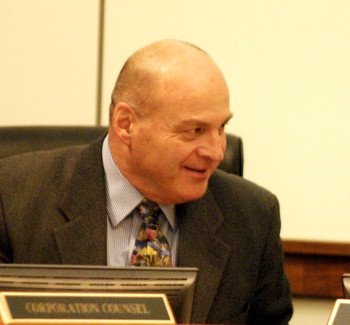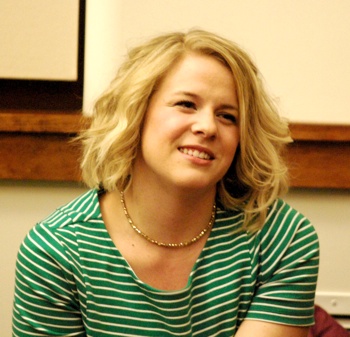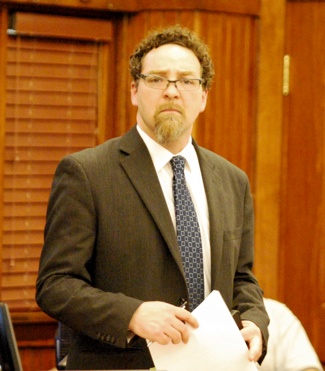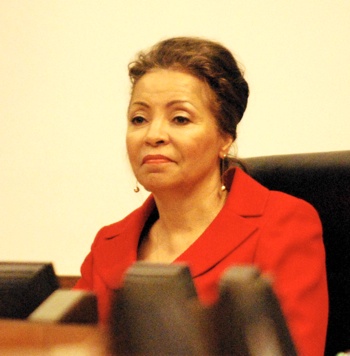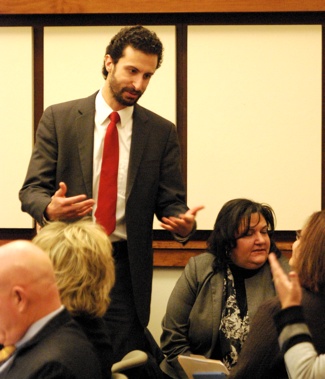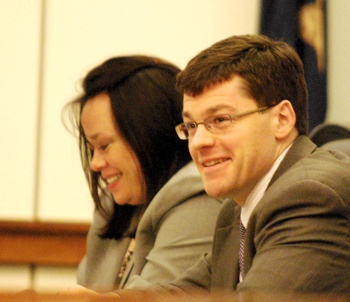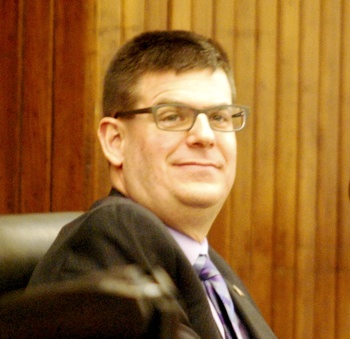County Board Handles Lawsuit, Art, Budget
Washtenaw County board of commissioners meeting (March 5, 2014): A light agenda at the March 5 meeting was punctuated by a relatively rare closed session to discuss pending litigation. The specific litigation wasn’t cited.
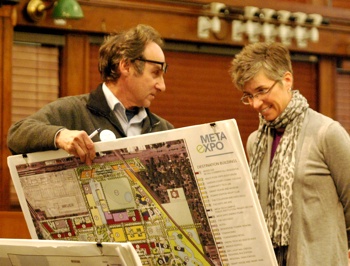
Jim Casha shows Mary Jo Callan, director of Washtenaw County’s office of community & economic development, a map of the Michigan state fairgrounds. Casha is advocating for the southeast Michigan regional transit authority to develop the site as a regional transit hub. (Photos by the writer.)
However, in the previous week, a jury had awarded nearly $1.2 million to a former Washtenaw County employee, Ali Aboubaker, who had filed a discrimination lawsuit against the county in 2011. Responding to a query after the March 5 meeting, corporation counsel Curtis Hedger told The Chronicle that the county would be evaluating its options for appeal. The administration would also be meeting with the county’s insurance carrier to discuss the situation.
In other action, the board gave initial approval to hire a contract position that would support budget-related work for the board and administration. The item had been originally considered, but postponed, at the Feb. 5, 2014 meeting. The vote on March 5 was 7-1, over dissent from Dan Smith (R-District 2). Rolland Sizemore Jr. (D-District 5) was absent.
Commissioners also voted to accept a grant from the Michigan Council of Arts and Cultural Affairs for the Youth Arts Alliance (YAA). Washtenaw County is the fiduciary for this five-county collaborative, which provides creative arts workshops to youth in the juvenile justice system. The county also provides office space for YAA.
The grant will pay local artists to install public art at each of the five county juvenile facilities, made with help from the youth at those facilities. The youth will also work with local musicians to create an original album. The alliance’s director, Heather Wilson, told commissioners: “We are seeing huge transformations with the kids experiencing creative arts as an outlet.”
During his communications to the board, chair Yousef Rabhi (D-District 8) laid out the application process to fill the seat on the Washtenaw County road commission board left vacant by the recent death of long-time road commissioner Fred Veigel. The deadline for submitting applications is Sunday, March 16. Rabhi hopes to make a nomination at the board’s March 19 meeting. The appointment would be to fill the remainder of Veigel’s term, through Dec. 31, 2014. During the March 5 meeting, commissioners passed resolutions honoring Veigel as well as local activist Lois Mayfield, who died on Feb. 21.
Commissioners also scheduled a public hearing to give input for the Washtenaw Urban County 2014-15 action plan. The hearing will be held at the county boardroom in downtown Ann Arbor during the March 19 meeting, which begins at 6:30 p.m. It’s intended to solicit feedback about proposed projects and programs that the county intends to implement with federal funding – through community development block grant (CDBG), HOME and emergency shelter grant programs – from July 1, 2014 through June 30, 2015.
The March 5 meeting included an update from Diane Heidt, the county’s human resources and labor relations director, about a proposal to offer autism health care coverage for county employees. A formal resolution is expected to be on the March 19 agenda for the board’s consideration.
Public commentary included advocacy from Jim Casha, who has previously addressed the board regarding the southeast Michigan regional transit authority. Washtenaw County is a member of the RTA, and the county board appoints two representatives to the RTA board. Casha’s remarks focused on the benefits of using the former state fairgrounds as a regional transit hub, instead of private development.
Pending Litigation
During the March 5 meeting, the board went into closed session for about 45 minutes to discuss pending litigation. That topic is one of the exceptions allowed under Michigan’s Open Meetings Act.
The specific litigation was not mentioned during the meeting.
The most recent news regarding a lawsuit against Washtenaw County was a nearly $1.2 million jury award given to a former employee, Ali Aboubaker. The award in the discrimination lawsuit was handed down on Feb. 27 – less than a week before to the county board’s March 5 meeting. The lawsuit had been filed in U.S. District Court in Detroit on Aug. 29, 2011. [.pdf of Aboubaker's complaint] [.pdf of jury verdict]
According to the complaint, Aboubaker worked for the county from 1991 until he was fired in July of 2008. He was originally hired as a bus driver, and was a maintenance technician when he was fired. The complaint states that he ”faced severe harassment from his supervisors and co-workers on the basis of his race, religion and national origin.” The lawsuit alleges that Aboubaker was denied promotion, and was fired when he filed a complaint with the Equal Employment Opportunity Commission. The county denied the claims made in the complaint.
The award included $221,490 in wages and fringe benefits for the period starting in July 2008; $614,028 in future wages and fringe benefits that would have been earned until retirement; and $250,000 in other damages. The award also included $1 in punitive damages.
Responding to a query after the March 5 meeting, corporation counsel Curtis Hedger told The Chronicle that the county will be evaluating its options for appeal. The administration would also be meeting with the county’s insurance carrier to discuss the situation, he said.
If the award stands, it would be one of the largest ever imposed against the county. Hedger and county administrator Verna McDaniel couldn’t recall any other discrimination case of this nature.
Youth Arts Alliance
The March 5 agenda included a resolution to authorize accepting a $21,980 grant from the Michigan Council of Arts and Cultural Affairs for the Youth Arts Alliance (YAA).
The YAA is a five-county partnership in southeast Michigan between the Washtenaw County children’s services department, the Monroe County youth center, the Lenawee County Maurice Spear campus, the Livingston County juvenile court, and the Jackson County youth center. It provides creative arts workshops to youth in the juvenile justice system.
Lisa Greco, director of the Washtenaw County children’s services department, said she was excited about the award to support the Youth Arts Alliance. Washtenaw County is acting as the fiduciary for the collaborative and the grant, she said. The county also houses the YAA office.
She introduced the team of people involved in the project who were attending the March 5 meeting: Kevin Mitchell, assistant director of the Washtenaw County youth center; management analyst Mike Langenright; Melissa Strong, director of the Monroe County youth center; Geremy Burns, director of the Jackson County youth center; and Heather Wilson, Youth Arts Alliance director.
Greco also thanked several others who couldn’t attend the meeting, including Jason Brooks from the county’s budget and finance department.
Greco noted that Wilson had been instrumental in getting this grant.
Wilson then addressed the board, describing the work of the YAA. It started in 2013 with four counties, she said, and more recently expanded to add Jackson County. During the YAA’s first year, over 1,400 workshops were provided to over 450 youth, with support from 48 community volunteers and a 20-person executive committee of juvenile justice professionals. The program operates in five of the 24 county juvenile facilities in the state, she said, “and we are seeing huge transformations with the kids experiencing creative arts as an outlet.” For any given workshop, 90% of the youth have never been exposed to the arts activity that’s presented, Wilson said. The workshops include visual arts, creative writing and theater.
Wilson joked that she didn’t know what was more impressive – the transformation of youth in YAA workshops, or the fact that five county governments were working together.
The grant from the Michigan Council of Arts and Cultural Affairs will pay local artists to go into each of the five county facilities and install public art – murals and mosaics that are made by the youth within that facility. The youth will also be working with local musicians to create an original album, Wilson said. YAA is planning a big event in September, she reported, saying she expected to see all of the commissioners there.
The county board can be proud of what’s happening, Wilson said. They should be proud of the visionary leadership in each juvenile facility to understand the creative needs of the kids in their care, “and how truly transformative and healing participating in the arts can be.”
Outcome: Commissioners unanimously authorized accepting the grant.
Road Commission Board
Applications are being accepted to fill the seat on the Washtenaw County road commission board left vacant by the recent death of long-time road commissioner Fred Veigel. The appointment process was announced by county board chair Yousef Rabhi during the March 5 meeting.
The deadline for submitting applications is Sunday, March 16. Rabhi hopes to make a nomination at the board’s March 19 meeting.
The appointment would be to fill the remainder of Veigel’s six-year term, through Dec. 31, 2014. Applications can be submitted to Peter Simms of the Washtenaw County clerk’s office at simmsp@ewashtenaw.org.
The road commission is overseen by a three-member board that’s appointed by the county board. The two current commissioners are Doug Fuller and Barb Fuller, who are not related. The organization manages the maintenance and repair of about 1,650 miles of roads in the county that are outside of cities and villages, including about 770 miles of gravel roads. The organization employs 115 full-time staff, down from 156 in 2004. [.pdf of 2013-2014 road commission budget] [.xls of all road commission projects 2014-2018] [.pdf list of unfunded projects 2014-2018]
The organization of the road commission has been the focus of a county board subcommittee that recently made a recommendation not to absorb the road commission’s operations into the county government. For more background, see Chronicle coverage: “No Major Change Likely for Road Commission.”
Veigel, who also served on the county parks & recreation commission as a representative of the road commission board, died on March 2.
At the March 5 county board meeting, commissioners passed a resolution honoring Veigel for his work. [.pdf of resolution honoring Veigel]
Outcome: This was not a voting item.
Staff for Budget Work
Commissioners were asked to give initial approval to a proposal to hire a contract position that would support budget-related work for the county board and administration. The item had been originally considered, but postponed, at the board’s meeting on Feb. 5, 2014.
This process started on Nov. 20, 2013 meeting, when commissioners gave direction to county administrator Verna McDaniel to research and recommend staffing options that would support the board’s community investment priorities. As part of adopting a four-year budget, the board set up a new strategic model to help it determine where the county’s resources should go. The board set goals as well as outcomes that are intended to measure how those goals are being achieved.
The priority areas for investment that were approved by the board in 2013 are: (1) ensure community safety net through health and human services, inclusive of public safety; (2) increase economic opportunity and workforce development; (3) ensure mobility and civic infrastructure for county residents; (4) reduce environmental impact; and (5) ensure internal labor force sustainability and effectiveness.
The dollar amount for this position wasn’t included in the resolution, which stated that “compensation shall not exceed the scope of the Administrator’s authority.” The administrator has discretion to spend up to $50,000 on professional services contracts, and up to $100,000 for any proposed goods, services, new construction or renovation. [.pdf of staff memo and resolution] A four-page job description had been included in the Feb. 5 board packet. The person would report to the county administrator in terms of daily operations. [.pdf of job description] [.pdf of scope of services]
The issue was debated at some length during the board’s Jan. 22, 2014 meeting, when commissioner Ronnie Peterson (D-District 6) questioned the process for hiring this kind of staff support. On Feb. 5, several commissioners expressed concern about spending money on this position and wanted more details about funding and duties, which led to the postponement.
There was no discussion of this item on March 5.
Outcome: On a 7-1 vote, commissioners gave initial approval to a contract staff position for budget work, over dissent from Dan Smith (R-District 2). Rolland Sizemore Jr. (D-District 5) was absent. A final vote is expected on March 19.
Public Hearing for Urban County Plan
The March 5 agenda included a resolution to schedule a public hearing for March 19. The purpose is to get public input for the Washtenaw Urban County 2014-15 action plan. The hearing will be held at the county boardroom in downtown Ann Arbor, 220 N. Main St., during the March 19 meeting, which begins at 6:30 p.m.
The county is soliciting feedback about proposed projects and programs that would be implemented with federal funding – through community development block grant (CDBG), HOME and emergency shelter grant programs – from July 1, 2014 through June 30, 2015. [.pdf of action plan]
The Urban County is a consortium of Washtenaw County and 18 local municipalities that receive federal funding for low-income neighborhoods. Members include the cities of Ann Arbor, Ypsilanti and Saline, and 15 townships. “Urban County” is a designation of the U.S. Dept. of Housing and Urban Development (HUD), identifying a county with more than 200,000 people. With that designation, individual governments within the Urban County can become members, entitling them to an allotment of funding through a variety of HUD programs. The Urban County is supported by the staff of Washtenaw County’s office of community & economic development (OCED).
Two HUD programs – the Community Development Block Grant and HOME Investment Partnership – are the primary funding sources for Urban County projects.
Outcome: Commissioners set the public hearing for feedback on the Urban County master plan, to be held on March 19.
Health Care Coverage for Autism
During the March 5 meeting, Felicia Brabec (D-District 4) noted that a subcommittee of the board has been working with Diane Heidt, the county’s human resources and labor relations director, to develop an option for the board to consider on offering health care coverage to county employees for the treatment of autism. The subcommittee includes Brabec, Andy LaBarre (D-District 7) and Ronnie Peterson (D-District 6). The board previously had been briefed on this issue at its Jan. 22, 2014 meeting.
On March 5, Heidt reported that they are continuing to gather information on what kind of coverage might be offered. All county employees are offered a core level of preferred provider organization (PPO) coverage, she explained, with the option to buy additional coverage levels. The employee premium-sharing for the core coverage is $75 per month. That’s what the county had negotiated with its bargaining units, Heidt said. The other levels of coverage have higher premiums for the same coverage, but the deductibles are lower.
If the county offered a rider for the autism spectrum disorder that’s provided by Blue Cross Blue Shield of Michigan, then the county would be able to seek reimbursement from the state of Michigan for any covered services related to autism. If the county offered some kind of coverage other than the BCBS rider, however, then it would be opening itself up to additional liability if a significant claim came in and the state decided not to reimburse it, Heidt said.
Heidt noted that Brabec and LaBarre are seeking additional information from clinicians in the field, regarding the kind of coverage that might be available.
LaBarre reported that he recently spoke with the parent of a student with autism who goes to school where his wife teaches. [LaBarre's wife is a special education teacher.] They talked about out-of-pocket costs, and the parent told him it cost about $30,000 annually. “It’s a significant, significant burden,” LaBarre said.
Brabec said that some of the information they’d be gathering relates to the cost of offering coverage for dependents aged 18-26, who aren’t eligible for reimbursement from the state.
Heidt reported that a resolution for the board has been drafted, and she hoped to bring it forward at the board’s March 19 meeting.
Conan Smith (D-District 9) asked whether it was within the purview of the county administrator to decide whether to offer the autism coverage to employees. He indicated that he didn’t think the board needed to vote on it. Heidt replied that the administration plans to seek board approval, because of the additional cost that offering the benefit would entail. [At the board's Jan. 22 meeting, Heidt had estimated that offering the coverage would result in up to a 5% increase in medical expenses, or up to $1 million annually. The county would expect to be fully reimbursed by the state of Michigan for the amounts that are allowed under the autism program.]
Dan Smith (R-District 2) wondered if Heidt knew what other companies are doing to cover autism treatment. Heidt replied that she’ll put that information in the memo that will accompany the resolution, based on information gathered from the Autism Alliance of Michigan and other sources. Many large corporations offer the coverage, she said, and several states mandate it.
Outcome: This was not a voting item.
Homeland Security Grant
Commissioners were asked to give initial approval to authorize the acceptance of $444,215 from the federal homeland security grant program, to fund projects and positions in the county sheriff’s office for a period from Sept. 1, 2013 through May 31, 2015.
According to a staff memo, each project was reviewed and recommended by Washtenaw County’s homeland security task force. Major allocations include $117,983 for the Washtenaw County Technical Rescue Team; $107,704 for Washtenaw County Sheriff Emergency Services; and $90,000 to continue funding an existing crime analyst position in the sheriff’s office. The position is dedicated to the Detroit/Southeast Michigan Fusion Center, which coordinates crime analysis efforts and regional information sharing. [.pdf of staff memo]
Outcome: Commissioners gave initial approval to authorize the grant acceptance. A final vote is expected on March 19.
“Prescription for Health” Grant
The March 5 agenda included a final vote to accept a two-year $226,357 ”Prescription for Health” grant from the Kresge Foundation. It will fund a part-time staff position and requires a $54,250 match from the county’s public health department. Commissioners had given initial approval to this item at their Feb. 19, 2014 meeting.
The county’s previous funding for this program was a two-year, $361,519 Kresge grant from Jan. 1, 2011 through Dec. 13, 2012. According to the program’s website, the purpose is ”to increase fruit and vegetable consumption among patients with low income, and to build capacity of clinics to expand the traditional medical model to include the food system.” The program also aims to strengthen relationships between clinics, farmers markets and the local food system. [.pdf of grant application]
According to a staff memo, analysis of feedback from 930 participants in 2011-2012 showed the following results:
Both years, the average daily consumption of fruits and vegetables increased by nearly one cup per day among patients who visited their local farmers market as measured by a pre- and post-program survey.
Participants overwhelmingly agreed that visiting the farmers market helped them and/or their family members eat more fruits and vegetables (96% Year 1; 94% Year 2).
Participants increased their awareness of other resources in the community. Both years, the number of participants who said they were aware that food stamps (Bridge/EBT cards) could be used at local farmers markets greatly increased from pre- to post-program (48% difference from pre to post Year 1; 43% difference Year 2).
Participants indicated that they were very likely to visit the farmers market again in the future at the conclusion of the program (98% Year 1; 97% Year 2).
The program had a positive economic impact on the local farmers markets, generating over $26,000 in new sales ($5,967 Year 1; $20,279 Year 2). Prescription for Health represented 9% of total sales at the Downtown Ypsilanti Market and accounted for 23% of the total sales at the Chelsea Bushel Basket Market.
Outcome: Commissioners unanimously voted to accept the Kresge grant.
Honoring Fred Veigel and Lois Mayfield
Commissioners passed resolutions honoring Fred Veigel and Lois Mayfield for their service to Ann Arbor and Washtenaw County. Mayfield died on Feb. 21. Veigel passed away on March 2.
Conan Smith (D-District 9) called both of them wonderful advocates and ardent supporters of the community. “I didn’t agree all the time with either one of them, but I really valued their passion,” he said. Yousef Rabhi (D-District 8) echoed Smith’s remarks, saying he’d attended Mayfield’s memorial service at St. Mary’s Student Parish. [Veigel's funeral was held the following week, on March 10.]
Mayfield’s resolution cited several examples of her work, including serving as executive director of the Welfare Advocacy Program in Ann Arbor, and vice chair for the Ann Arbor Democratic Party’s mature adult issues committee. The resolution stated that she “served as a mentor to countless leaders, stood tall among the powerful – and when necessary – kept them in line with the sheer force of her character.” [.pdf of resolution honoring Mayfield]
The resolution honoring Veigel cited his 23 years of services as a Washtenaw County road commissioner, and as a member of the Washtenaw County parks & recreation commissioner since 2000. He was the longest-serving president of the Huron Valley Central Labor Council of the AFL-CIO. [.pdf of resolution honoring Veigel]
Outcome: Both resolutions pass unanimously.
Communications & Commentary
During the March 5 meeting there were multiple opportunities for communications from the administration and commissioners, as well as public commentary. In addition to issues reported earlier in this article, here are some other highlights.
Communications & Commentary: Prisoner Re-Entry Program
Yousef Rabhi (D-District 8) announced that Joe Summers is organizing a forum on Saturday, March 29 to discuss the Washtenaw prisoner re-entry program. There’ve been some cuts in state funding, so a group of local citizens are trying to figure out how to sustain the initiative. No location had yet been determined, he said.
Ronnie Peterson (D-District 6) asked whether any county staff were involved in this program. Rabhi said he knew the sheriff’s office was involved to some degree.
Peterson told other commissioners that it was important to be aware of the program and its lack of support. The board should take an interest, because it’s an important program, he said. You can’t send people home, who’ve paid their debt to society, without a support system and without resources. Without sufficient state funding, Peterson noted, the responsibility falls on the local communities. It’s a statewide problem, and the system should be changed, he said. He hoped the board would have more discussion on this issue.
Conan Smith (D-District 9) told Peterson that county prosecutor Brian Mackie is active on the prisoner re-entry steering committee, as is Delphia Simpson from the county public defender’s office, Ellen Schulmeister of the Shelter Association of Washtenaw County, and several others. Smith noted that a little funding is provided through the local coordinated funding program, in which the county participates. It’s a big concern, Smith said. “In this down economy, we’ve seen a real decline in the strategic support for this issue.”
Washtenaw County has been a leader on prisoner re-entry in Michigan, Smith said, “and we should stay in that position, by all means.”
Andy LaBarre (D-District 7), who chairs the board’s working sessions, said he’d make a working session available for this issue to discuss it further.
Communications & Commentary: Regional Transit Authority (RTA)
Jim Casha addressed the board, saying he was there again to talk about the southeast Michigan regional transit authority (RTA) and the possible acquisition of the Michigan state fairgrounds. [He had previously spoken about this issue at at the board’s Jan. 8, 2014 and Jan. 22, 2014 meetings.]
He showed commissioners a map that indicated the locations of several buildings on the site that could be used for a temporary or permanent regional transportation hub at a very low cost. “You really can’t have a better location for a regional transportation center,” he said.
Casha questioned whether the transfer of the property is being handled legally, and whether the public should have had the opportunity to bid on it at a public auction. [The property had been transferred to the Michigan Land Bank in 2012. In the fall of 2013, the land bank's board voted to transfer the property to a development team that includes Magic Johnson.]
Casha hoped to convince the RTA board to at least try to delay the transfer of the land, so that it could be evaluated as a possible public transportation center. He said he’d attended the recent Detroit Policy Conference, where it was stressed that Detroit problems need to be addressed on a regional level. If there’s no effort to collaborate on a regional level, Detroit’s problems will never get solved. “What better way to solve a regional problem – especially a regional transportation problem – than by building an iconic regional transportation hub,” Casha said.
The RTA board seems to be stalling, Casha said. He argued that they’ve failed to pursue the fairgrounds, they’ve failed to hire a director, and now they’ve postponed putting a tax proposal on the ballot until 2016. They need to speed up the process, he said. He wanted the county commissioners to pass a resolution requesting that the RTA board ask the land bank to postpone transferring the fairgrounds until the RTA has evaluated it. He also wanted the county board to formally request that SEMCOG [the Southeast Michigan Council of Governments] cease meeting with private developers and instead start protecting the interests of the SEMCOG member communities.
Communications & Commentary: Thomas Partridge
Speaking during both opportunities for public commentary, Thomas Partridge called on commissioners to address the housing needs of county residents, especially during the cold winter. Residents also need access to affordable transportation, health care and education, he said. There should be no excuses from the county to take on these issues. The goal should be to eliminate homelessness in Washtenaw County by building affordable housing throughout the county, and by supporting viable public transportation.
Partridge also demanded that all meetings of all county boards and commissions be held in the boardroom of the county administration building in downtown Ann Arbor, and be taped for broadcast on Community Television Network and posted online. The county is too fragmented, he said. The Washtenaw Community Health Organization (WCHO) should have a representative attending the county board meetings. He contended that the WCHO is working with the legislature that’s “under the right wing leadership of the Snyder administration” to take away the rights of Washtenaw County residents to have considerate, friendly health care. The WCHO board holds its meetings at its Zeeb Road office, he said, out of public view. Too many other boards and commissioners are doing the same thing, Partridge said. That kind of thing lends itself to corruption, he said.
Present: Felicia Brabec, Andy LaBarre, Kent Martinez-Kratz, Ronnie Peterson, Alicia Ping, Yousef Rabhi, Conan Smith, Dan Smith.
Absent: Rolland Sizemore Jr.
Next regular board meeting: Wednesday, March 19, 2014 at 6:30 p.m. at the county administration building, 220 N. Main St. in Ann Arbor. The ways & means committee meets first, followed immediately by the regular board meeting. [Check Chronicle event listings to confirm date.] (Though the agenda states that the regular board meeting begins at 6:45 p.m., it usually starts much later – times vary depending on what’s on the agenda.) Public commentary is held at the beginning of each meeting, and no advance sign-up is required.
The Chronicle could not survive without regular voluntary subscriptions to support our coverage of public bodies like the Washtenaw County board of commissioners. Click this link for details: Subscribe to The Chronicle. And if you’re already supporting us, please encourage your friends, neighbors and colleagues to help support The Chronicle, too!




